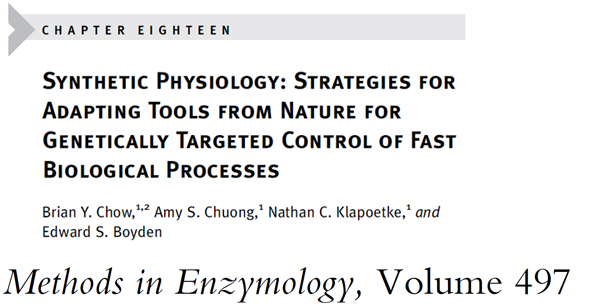Synthetic Physiology: Strategies for Adapting Tools from Nature for Genetically-Targeted Control of Fast Biological Processes
[Publisher Link] [Local Copy]
Chow, B. Y.*, Chuong, A. S. *, Klapoetke, N. C. *, Boyden, E. S. (2011) Synthetic Physiology: Strategies for Adapting Tools from Nature for Genetically-Targeted Control of Fast Biological Processes, Methods in Enzymology 497:425-43. (* co-first authors)

The life and operation of cells involve many physiological processes that take place over fast timescales of milliseconds to minutes. Genetically encoded technologies for driving or suppressing specific fast physiological processes in intact cells, perhaps embedded within intact tissues in living organisms, are critical for the ability to understand how these physiological processes contribute to emergent cellular and organismal functions and behaviors. Such “synthetic physiology” tools are often incredibly complex molecular machines, in part because they must operate at high speeds, without causing side effects. We here explore how synthetic physiology molecules can be identified and deployed in cells, and how the physiology of these molecules in cellular contexts can be assessed and optimized. For concreteness, we discuss these methods in the context of the “optogenetic” light-gated ion channels and pumps that we have developed over the past few years as synthetic physiology tools and widely disseminated for use in neuroscience for probing the role of specific brain cell types in neural computations, behaviors, and pathologies. We anticipate that some of the insights revealed here may be of general value for the field of synthetic physiology, as they raise issues that will be of importance for the development and use of high-performance, high-speed, side-effect free physiological control tools in heterologous expression systems.